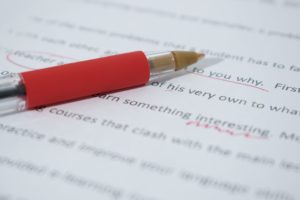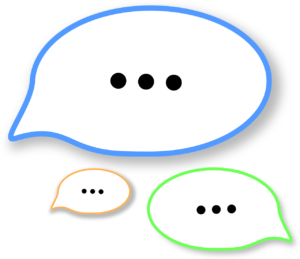I really wanted to title this “Conquer Dialogue Punctuation, PLEASE!” but thought it might be a bit much. It’s not easy. Let’s all admit that. No one is born knowing how. And writers have all kinds of excuses for struggling with dialogue punctuation.
- Don’t remember what I learned in school, but what I did learn sometimes gets flagged. (True for all of us.)
- The rules seem so random. (They’re not, but they can seem so.)
- When I read other books I either a) don’t pay attention to well-edited punctuation, so I’m not absorbing it as normal or b) I’m reading books that haven’t been well-edited. (Well, those are things you can change.)
- I don’t think it’s that big of a deal. Isn’t that what the publishing house editor is for, to fix anything I messed up or missed? (It’s a big deal. You’ll see why below.)
- I would learn the correct way, but I don’t know the WHY of the rules. (That’s the reason for this blog post! Keep reading!)
Punctuation Sources
 API has long been the go-to resource for journalists. But for today’s fiction and nonfiction books, the CMOS (Chicago Manual of Style) is THE source. It’s long, yes. It’s complex, yes. It changes annually if not more often as language and publishing styles evolve. So if you purchased a copy when you graduated from college or when you decided to write a book, you’ll need the updated version. Many recommend subscribing to the online version.
API has long been the go-to resource for journalists. But for today’s fiction and nonfiction books, the CMOS (Chicago Manual of Style) is THE source. It’s long, yes. It’s complex, yes. It changes annually if not more often as language and publishing styles evolve. So if you purchased a copy when you graduated from college or when you decided to write a book, you’ll need the updated version. Many recommend subscribing to the online version.
But studying CMOS/CMS can be a daunting proposition. And each publishing house has their own style sheet with slight variations.
So learning a few basics and adopting them as habit can be a great use of an author’s time. It will also save time for a critique partner, contest judge, agent, and editor. More importantly still, it will make your work more professional and readable, eliminating confusion or stumbling blocks. 
It’s been addressed before on the Books & Such blog (check the archives), but it’s an ongoing need, and sometimes, another angle is what will help a writer “see” what has been foggy in the past.
Starting Points for Conquering Dialogue Punctuation
 Every sentence needs punctuation of some kind. So in your last pass through your proposal or manuscript (or email), check to make sure no sentence is left untethered by end punctuation. WHY: The reader needs to know you’re finished with that sentence and that it isn’t a typo or that you intended to write more but forgot.
Every sentence needs punctuation of some kind. So in your last pass through your proposal or manuscript (or email), check to make sure no sentence is left untethered by end punctuation. WHY: The reader needs to know you’re finished with that sentence and that it isn’t a typo or that you intended to write more but forgot.
Another basic. Most sentences require a period or a question mark. Few sentences (maybe only ten in your lifetime, despite the number I’ve already used here) will legitimate require an exclamation point. Ten is an underestimate, but a good goal. 🙂 WHY: If you use strong verbs and have well established the scene and the character’s traits, exclamation points are unnecessary, except in the case of FIRE!
In dialogue, quotation marks are an important element of punctuation. But they need proper placement, and–take note–they need to face the right direction. Think of the direction of quotation marks as the cupped hands that hold the line of dialogue together. The left side (or front) of the sentence quotation mark will be cupped toward the sentence. The right side (or end) of the sentence quotation mark will always be cupped back toward that sentence.
We know that, but it might amaze you how many writers turn in a project with an occasional quotation mark facing the wrong direction. WHY is it important? A right-cupped quotation mark signals to the reader’s brain that a new quote is beginning. If you can’t seem to force it to face the correct direction, try putting a fake letter, then hit the quotation key (which will do an END quote curve), then backspace and remove the fake letter.
Ellipses versus Emdash in Dialogue
Simple rule here, but not always automatic for a writer. WHY: An ellipses at the end of a line of dialogue signals that the thought is either intentionally unfinished by the character, not wanting to add the final words, or that the dialogue is dribbling off to no real conclusion. “I would say more here, but…” An emdash (typically the length of two dashes glued together) is used to signal that the speaker is interrupted, either by action or by another speaker. “I would say more her, but–” “You don’t deserve to say one more word. This is my stage, not yours.”
Speaker Attributions versus Action Beats
Let’s talk speaker attributions (he said/she said–WHO said it) versus action beats (he clutched his throat/she took a deep breath–HOW it was said or what was happening while it was being said). Mixing up the two is more common than you’d think. But it’s as important as any other dialogue punctuation rule. WHY: Again, it’s all about communication. Not what the writer knows in his or head, but what comes across on the page to a reader.
INCORRECT: “If I get to the post office before noon,” she flipped through the envelopes in her hand, “these may still reach them in time.”
CORRECT: “If I get to the post office before noon,” she said, flipping through the envelopes in her hand, “these may still reach them in time.” (Correct because we turned it into a speaker attribution before adding an action beat.)
ALSO CORRECT: “If I get to the post office noon”–she flipped through the envelopes in her hand–“these may still reach them in time.” (Correct because we punctuated it properly for dialogue with an action beat and no speaker attribution. No punctuation inside the first end quotation mark, emdashes setting off the action beat on each end, then both front and back quotation marks for the rest of the sentence.)
Another example.
INCORRECT: “You’ll never catch me at a dance.” He said. (A speaker attribution at the end needs a comma in the dialogue, not a period. And a speaker attribution placed here and punctuated with a capital letter and a period looks like a complete sentence rather than a speaker attribution.)
CORRECT: “You’ll never catch me at a dance,” he said.
ALSO CORRECT: “You’ll never catch me at a dance.” He said the words as if he’d rehearsed them for years. (In this case, the period after dance works, because the next “he said part” is the beginning of a complete sentence.
For those who are not strangers on how to conquer dialogue punctation, this may have been a mere refresher. Or it may help you explain the principles to other writers you coach or encourage.
Added Value
Not dialogue, per se, but when referencing a quote or information taken from another source, the parenthetical reference always comes before the end punctuation of that sentence. WHY: The period ends the sentence. Anything that comes after that looks like it belongs to the next bit of information or next sentence.
INCORRECT: When Leah felt at her worst during her chemo treatments, when even water upset her fragile stomach, she often leaned on the truth that God would lead her beside still, or as some describe them, stilled (or quiet) waters. (Psalm 23:2) That beautiful word picture had a calming effect despite the raging chemicals flowing through her body.
CORRECT: When Leah felt at her worst during her chemo treatments, when even water upset her fragile stomach, she often leaned on the truth that God would lead her beside still, or as some describe them, stilled (or quiet) waters (Psalm 23:2). That beautiful word picture had a calming effect despite the raging chemicals flowing through her body.
REASON: The Scripture reference is attached to the sentence it references. The period ends that sentence.


 What is a “Christian” Book?
What is a “Christian” Book?
“This is a great post,” she said, wiping imaginary—or some instances real—perspiration off her brow.
I always learn so much from this blog. You’re correct. Most of the time it’s the “why” that eludes me, as a writer. It’s like singing – you may be a naturally good vocalist, but to be a professional, you need to know and be able to implement the rules, or have that CMOS handy!
Thanks, Regina. They WHY means a lot to me too, especially when addressing ingrained habits!
When in convo I engage
I often can’t resist
to end the chatter, turn the page,
with a well-directed fist.
It’s not that I’m a rotten sort,
addicted to the things untoward;
it’s just best to keep it short
for I’m so easily bored,
and thus my characters, of course;
from me they stray not far.
They’re finest on a cutting-horse,
or in a seedy bar
where dialogue, you understand,
goes with a cosh in beer-less hand.
Always the stellar imagination, Andrew!
Love this. One thing I see in dialog sometimes is the period outside the quotation marks. Or, not dialog, but this: They left the enormous “cottage”. I’ve always been taught the period goes inside the quotation marks like this: They left the enormous “cottage.”
Yes, that’s a tricky one…and I see it a lot! Even with just a one-word quote, like the word “cottage” in the above instance, you are correct in saying that the period goes inside the final quote mark.
Thanks for a great refresher, Cynthia! (Removing that exclamation point now…)
🙂
I’ll always read through punctuation lessons, because this brain can only hold so much.
Have a great day! (Not removing that one…)
Sometimes a well-placed exclamation point is a joy-bringer!
Thank you, Cynthia! This was a helpful refresher to confirm what I thought was right, and also since I teach these points to my teen students all the time.😊 But I’ve struggled to give them a good explanation of why the period goes after the citation of a quote (in MLA format for an essay) since they have usually learned to always put the period inside the quotation marks. Thank you for finally giving me a clear and sensible reason!😊
Oh, that blesses me, Kiersti!
These are great, Cynthia! It took me a long time to learn these, and occasionally, I still have to look stuff up. I have a wonderful friend who loves all things grammar and helped me so much along the way!
We all need a resource and a very knowledgeable and up-to-date friend!
Thank you, dear Cynthia, for helping us “conquer dialogue punctuation.” You explained these well. When we understand the why of the rules, it helps us apply them. I’ve bookmarked this post.
Blessings ~ Wendy Mac
Great article on punctuation in dialogue! This is an important topic for writers and editors. And how great that you shared this information. Well-designed dialogue can greatly enhance the reading experience. And by the way, speaking of enhancing the experience, I want to add that visiting this spa is a great way to relax and take a break from creative endeavors. When the brain is overloaded with correct punctuation and dialogue, a spa can become a sanctuary for the body and mind. It is always useful to find a balance between work and rest.